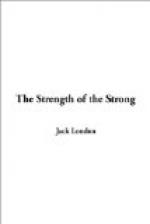Coming down Geary Street were six meat waggons. Beside each scab driver sat a policeman. Front and rear, and along each side of this procession, marched a protecting escort of one hundred police. Behind the police rearguard, at a respectful distance, was an orderly but vociferous mob, several blocks in length, that congested the street from sidewalk to sidewalk. The Beef Trust was making an effort to supply the hotels, and, incidentally, to begin the breaking of the strike. The St. Francis had already been supplied, at a cost of many broken windows and broken heads, and the expedition was marching to the relief of the Palace Hotel.
All unwitting, Drummond sat beside Catherine, talking settlement work, as the auto, honking methodically and dodging traffic, swung in a wide curve to get around the apex. A big coal waggon, loaded with lump coal and drawn by four huge horses, just debouching from Kearny Street as though to turn down Market, blocked their way. The driver of the waggon seemed undecided, and the chauffeur, running slow but disregarding some shouted warning from the crossing policemen, swerved the auto to the left, violating the traffic rules, in order to pass in front of the waggon.
At that moment Freddie Drummond discontinued his conversation. Nor did he resume it again, for the situation was developing with the rapidity of a transformation scene. He heard the roar of the mob at the rear, and caught a glimpse of the helmeted police and the lurching meat waggons. At the same moment, laying on his whip, and standing up to his task, the coal driver rushed horses and waggon squarely in front of the advancing procession, pulled the horses up sharply, and put on the big brake. Then he made his lines fast to the brake-handle and sat down with the air of one who had stopped to stay. The auto had been brought to a stop, too, by his big panting leaders which had jammed against it.
Before the chauffeur could back clear, an old Irishman, driving a rickety express waggon and lashing his one horse to a gallop, had locked wheels with the auto. Drummond recognized both horse and waggon, for he had driven them often himself. The Irishman was Pat Morrissey. On the other side a brewery waggon was locking with the coal waggon, and an east-bound Kearny Street car, wildly clanging its gong, the motorman shouting defiance at the crossing policeman, was dashing forward to complete the blockade. And waggon after waggon was locking and blocking and adding to the confusion. The meat waggons halted. The police were trapped. The roar at the rear increased as the mob came on to the attack, while the vanguard of the police charged the obstructing waggons.
“We’re in for it,” Drummond remarked coolly to Catherine.
“Yes,” she nodded, with equal coolness. “What savages they are.”
His admiration for her doubled on itself. She was indeed his sort. He would have been satisfied with her even if she had screamed, and clung to him, but this—this was magnificent. She sat in that storm centre as calmly as if it had been no more than a block of carriages at the opera.




